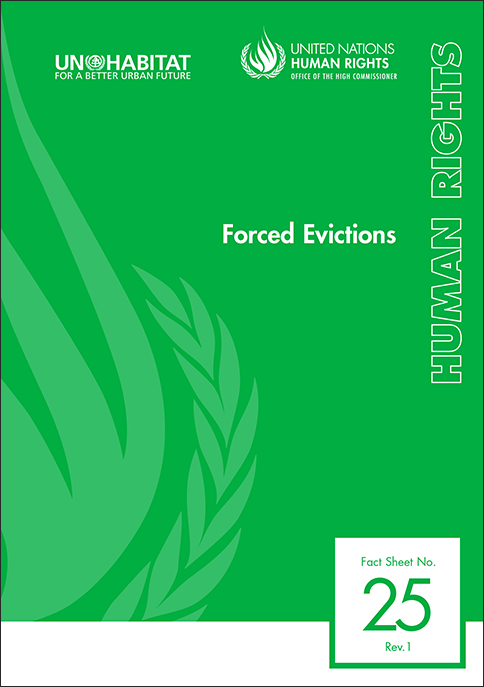Forced evictions and human rights
OHCHR and land and human rights
The practice of forced eviction constitutes a gross violation of human rights, in particular the right to adequate housing.
Commission on Human Rights, Resolution 1993/77
Every year, millions of people around the world are forcibly evicted from their homes and their land, often leaving them living in extreme poverty and destitution. Forced evictions can be severely traumatic. They set back even further the lives of those that are already marginalized or vulnerable in society. Moreover, forced evictions violate a wide range of internationally recognized human rights, including the rights to adequate housing, food, water, health, education, work, security of the person, freedom from cruel, inhuman and degrading treatment, and freedom of movement.
The international framework
Forced eviction is “the permanent or temporary removal against their will of individuals, families and/or communities from the homes and/or land which they occupy, without the provision of, and access to, appropriate forms of legal or other protection” (Committee on Economic, Social and Cultural Rights, general comment No. 7).
In exceptional circumstances, evictions may be permissible under international human rights law. Yet, they need to be fully justified, authorized by law and in full compliance with relevant provisions of international human rights and humanitarian law, and subject to recourse.
Learn more about various forms of forced evictions and international legal obligations
Fact Sheet No. 25/Rev.1 on Forced Evictions
PDF: العربية | 中文 | English | Français | русский | Español
Assessing forced evictions
The Forced evictions Assessment Questionnaire is a tool for addressing situations of forced eviction. It offers guidance on putting events in context, assessing the human rights impact, offering practical advice to all those involved, and monitoring and reporting on the situation.
Eviction impact assessment methodologies
The impacts of forced evictions go far beyond material losses, leading to greater inequality, marginalization and social conflicts. In the context of development, infrastructure projects, land acquisitions, urban renewal and mega events, eviction impact assessments are needed to:
- Consider the wide range of impacts, and argue in favour of less harmful solutions and alternatives to the foreseen project;
- Estimate the real costs related to eviction and displacement of individuals and community that goes far beyond the mere market price of physical structures; and
- Allow for a better quantification of claims, including in regard to compensation.
Learn more
How to report human rights violations related to forced evictions
Requests for information and complaints of violations of human rights as a result of evictions can be addressed to various human rights mechanisms. A useful overview of these mechanisms can be found in this handbook.
Videos
Serbia Housing Rights
20 May 2016
Stop Forced Evictions
15 December 2015
This video is also available in Spanish and French
